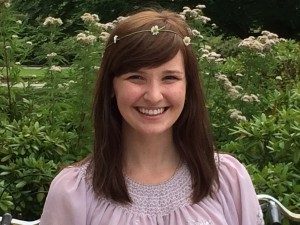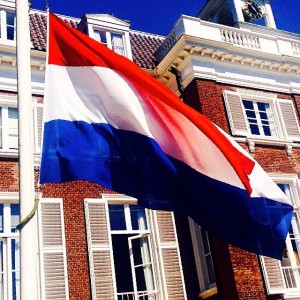Victoria Barker, United States of America
 As I biked to the Clingendael Institute of International Relations this morning, the city seemed eerie — I hardly passed anyone else on the usually bustling bike path. The whole city seemed to be hardly moving. As I arrived at Clingendael, I took in the incredible beauty of the campus that strikes me every morning. Even here something was different. I noticed the Dutch flag flying at half-staff and realized that it must be to honor the victims of the Malaysia Airlines Flight 17. This “National Day of Mourning”, as it is known, is the first time in over forty-two years that the entire country of Holland has stood still to mourn for the victims of a horrific event. The feeling of loss and shock is truly palpable around The Hague. As 4:00 pm approached and the nation grew silent, I reflected on this tragic event and other tragedies that are occurring worldwide. Thousands of lives have been lost over the past week as a result of violent conflicts. What do these disasters mean for the international community? Two weeks ago, my answer would have probably been politically charged and perhaps bitter about the ongoing conflict in Ukraine that had affected so many people that I know. Today my answer is different.
As I biked to the Clingendael Institute of International Relations this morning, the city seemed eerie — I hardly passed anyone else on the usually bustling bike path. The whole city seemed to be hardly moving. As I arrived at Clingendael, I took in the incredible beauty of the campus that strikes me every morning. Even here something was different. I noticed the Dutch flag flying at half-staff and realized that it must be to honor the victims of the Malaysia Airlines Flight 17. This “National Day of Mourning”, as it is known, is the first time in over forty-two years that the entire country of Holland has stood still to mourn for the victims of a horrific event. The feeling of loss and shock is truly palpable around The Hague. As 4:00 pm approached and the nation grew silent, I reflected on this tragic event and other tragedies that are occurring worldwide. Thousands of lives have been lost over the past week as a result of violent conflicts. What do these disasters mean for the international community? Two weeks ago, my answer would have probably been politically charged and perhaps bitter about the ongoing conflict in Ukraine that had affected so many people that I know. Today my answer is different.
For the past week and a half, I along with thirty five other “peacemakers” have been studying in The Hague, The Netherlands.  Led by the International Peace and Security Institute and taught by various professors, lawyers and social scientists from across the globe we have focused on post-conflict transitions and the role of international justice. It came as no surprise last Thursday afternoon when we worked on a simulation focused on the role of the International Criminal Court in the current conflict in Eastern Ukraine — it was a relevant topic, to say the least. Later that day, the media was flooded with reports of a plane crash in Eastern Ukraine. The shock increased upon learning that this plane left from Schiphol International Airport in Amsterdam — the same airport where five days prior we had all arrived to embark on this month long peace training program. The magnitude of the crash hit close to home, in a sense, as I learned that some of the victims were from The Hague. People in the community where I am living are mourning the loss of a seventeen-year old girl, her younger brother, and their parents. And the rest of Holland is mourning the deaths of nearly two hundred men, women and children who had bright futures ahead.
Led by the International Peace and Security Institute and taught by various professors, lawyers and social scientists from across the globe we have focused on post-conflict transitions and the role of international justice. It came as no surprise last Thursday afternoon when we worked on a simulation focused on the role of the International Criminal Court in the current conflict in Eastern Ukraine — it was a relevant topic, to say the least. Later that day, the media was flooded with reports of a plane crash in Eastern Ukraine. The shock increased upon learning that this plane left from Schiphol International Airport in Amsterdam — the same airport where five days prior we had all arrived to embark on this month long peace training program. The magnitude of the crash hit close to home, in a sense, as I learned that some of the victims were from The Hague. People in the community where I am living are mourning the loss of a seventeen-year old girl, her younger brother, and their parents. And the rest of Holland is mourning the deaths of nearly two hundred men, women and children who had bright futures ahead.
This horrible event furthers everything that I have been learning over the past 10 days in The Hague and in time will serve as a call to action — people matter and peace as difficult (or nearly impossible) as it might be to create, is vital. We have spent the past week and a half discussing former and current conflicts. In every instance, we have read about and discussed the loss of lives that these conflicts have caused. Human lives matter regardless of the area or the conflict, be it Syria, Israel or Palestine, Ukraine or Holland, The United States, or South Sudan.
Historically, Holland has had its share of violent happenings. The Clingendael Institute was the home of a prominent Nazi leader during the occupation. Some of the buildings on these grounds were used as interrogation rooms. This place was home to so much violence and hate. Today, it is an institute dedicated to studying and creating peace worldwide and one of the most serene places I have ever been. It is a reminder that even the most horrendous places can become harmonious.
While there are undoubtedly foreign policy implications for the actors involved, and justice to be had for the families and victims of the attack, today is a day to simply reflect on the lives of the people who were on board the plane and to unite with their families and friends in mourning their passing. It is also a time to stand behind the people who continue to be affected by the violence in Ukraine, regardless of whose side they are on. I think I can speak for all of us at the IPSI Symposium here in The Hague when I say, that we all stand for peace in conflict areas and since The Hague has become our home for the summer, we stand with Holland and the rest of the international community in mourning the loss of the victims of the MH17 crash. It is instances like these that further the mission the 36 of us came for — to learn “transitional justice skills and pragmatic peace building work”.

